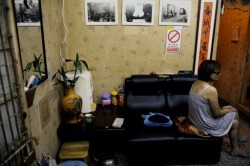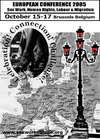 This is one of the images some feminists objected to in an H&M advertising campaign a year ago. The object to be sold is underwear, so there’s no way to advertise it without showing flesh. I’m thinking about this in relation to the idea of Gender Equality, taking the case of Sweden, where H&M has its home. While I intuitively understand the concept of equality as a general principle, I don’t when it applies to sex. I have never understood how we think we can absolutely measure the sexual experience or know when people have enjoyed themselves ‘equally’. Lots of people know when they haven’t had a good time in bed, but in fact many people also don’t know because they haven’t had enough experience to be able to compare. And taste comes into it, one man’s meat is another man’s poison. As well as the fact that we indisputably are trapped within patriarchy. That’s the direction I’m taking in my exploration of the meaning of hegemonic Gender Equality policy at The Local, a Swedish news site in English. And here’s the underwear one commentator thinks might be ‘equal’ enough to please some feminists:
This is one of the images some feminists objected to in an H&M advertising campaign a year ago. The object to be sold is underwear, so there’s no way to advertise it without showing flesh. I’m thinking about this in relation to the idea of Gender Equality, taking the case of Sweden, where H&M has its home. While I intuitively understand the concept of equality as a general principle, I don’t when it applies to sex. I have never understood how we think we can absolutely measure the sexual experience or know when people have enjoyed themselves ‘equally’. Lots of people know when they haven’t had a good time in bed, but in fact many people also don’t know because they haven’t had enough experience to be able to compare. And taste comes into it, one man’s meat is another man’s poison. As well as the fact that we indisputably are trapped within patriarchy. That’s the direction I’m taking in my exploration of the meaning of hegemonic Gender Equality policy at The Local, a Swedish news site in English. And here’s the underwear one commentator thinks might be ‘equal’ enough to please some feminists:
Violence Against Women: Too much of a bad thing?
Laura Agustín, The Local, 10 November 2009
It might sound odd to talk about silences on the topic of gender equality in Sweden, since discussions of it seem to run non-stop. But that is how hegemony works: a constant bombardment of words, most of which reiterate the opinions of a single powerful group. Differences of opinion are usually quibbles over details to a central idea that’s accepted as being indisputable because it’s supposed to be normal.
Gender equality in Sweden is a perfect example. Voices that want to question its foundations are not heard, which is what Maria Abrahamsson, a veteran editorial writer for Svenska Dagbladet, meant when she said that ‘open discussion’ is missing about certain aspects of gender law and policy.
Some of what you hear from state feminists refers to assuring that women are represented in government and paid as well and have the same opportunities to work as men, and that men have the same opportunities to be good parents that women do. These are the policies for which Sweden ranks highly compared with most other countries. When the word jämställdhet is heard here, chances are that the details of these issues are being discussed. I say details because the policies have been in place for some time, and no one questions the need to make citizens in general more ‘equal’ in a democratic-type society.
The problem is that much of what state feminists say centres around the concept of Violence Against Women (våld mot kvinnor, often referred to as kvinnofrid, the legal protection of women). The mantra is ‘We have a big problem with violence against women’. Repeated over and over, it becomes a truth difficult to break into questionable pieces, rather providing a reason for endless conversations about how to stop men from committing aggressions against women. A point of view that says ‘Wait a minute, all those things you’re talking about shouldn’t be called violence!’ is rarely heard in public discussions.
It’s not that people in Sweden, feminists and non-feminists alike, never discuss this exaggerated notion of violence in bars, cafes, emails, blogs and occasional seminars. The issue is that the basis of policy, the quite extreme definition of violence and the reductionist idea of what’s ‘good for women’ is so rarely questioned in any visible, public way, whether the mainstream media or parliament. And by questioning I don’t mean the occasional online article with its cloud of comments; I mean a sustained conversation.
Violence Against Women (often known in English-speaking countries as VAW) is problematic when it relies on the idea that women are always, innately weaker than men. More than physical strength is at stake, although the words heard most are abuse, assault, battering. VAW has come to signify different sorts of coercion, threats, and moral strangleholds men are conceived as naturally committing on women, just because men are born that way. Women’s bodies are conceived as inherently vulnerable to men’s invasion and use, which oddly doesn’t produce a demand that women be granted full autonomy over their own bodies.
Partial autonomy is granted: women shall be allowed to have abortions and be listened to when they say No to sex. These are great as far as they go. But on other issues, women’s bodies are conceived as objects for government policymakers to decide about: a contradiction that drives many women, the world over, round the bend. Gender policy is also problematic when it assumes that women are innately better than men – kinder, more peaceful, more capable of love, less capable of violence, preferring certain forms of balanced, meaningful sex.
Louise Persson’s blog frihetspropaganda is the best place I know to hear the other point of view in Sweden. Blogging since December 2003, Persson is the author of Klassisk Feminism. Discussing an H&M advert that showed a woman wearing underwear in her home, which one state feminist, Gudrun Schyman, not only denounced as soft porn but also equated with hard porn, prostitution, trafficking and slavery, Persson complains that Schyman presumes to speak for All Women. In the case of the underwear advert, we can ask: What about women who want to wear sexy lingerie at home, or be photographed wearing it, or make money being photographed wearing it or wear it as a prelude to selling sex?
It was a rare occasion the other night when Aschberg brought Abrahamsson together with Schyman to discuss how gender-equal Sweden is. Abrahamsson said yes, Sweden is gender-equal, especially relative to the rest of the world, and would like to stop talking about jämställdhet and switch to jämlikhet – another word for equality that hasn’t got the baggage of gender and sex. Schyman said no, Sweden isn’t gender-equal and, interestingly, complained that she has no one to discuss the problem with. (Would she like to talk with the model in the H&M ad?)
I’ve got questions about the idea of equality in the first place. Must it mean sameness, exact balance, symmetry? Especially in the area of sex and bodies, that will always be impossible. The core complaint against Sweden’s version of gender equality is that the diversity of women’s mental, spiritual and sexual desires is not recognised and that women who conceive of their bodies differently, who feel empowered in other ways than VAW hegemony recognises, are ignored.
This difference of vision is the subject of exhausting, resource-wasting battles all over the world – which I wrote about some years ago under the title Utopic Visions or Battle of the Sexes? The conflict, if possible, has only grown more venomous since then. How is it that Sweden, with its cultural value on avoiding conflict, can reconcile causing so much of it?












